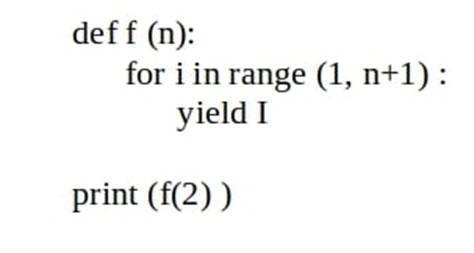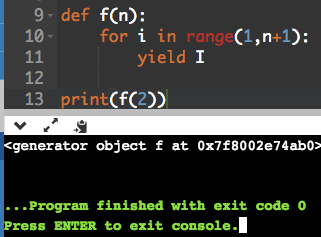What is the expected behavior of the following code?

It will:
What is the expected behavior of the following code?

It will:
B

yield keyword expression is I (capital i), while for loop variable is i (small I). Function is erroneous.
It works for me even is i and I, check my code up
the capital I would cause an error if you were to iterate through actual generator obj, for example in [for i in f(2)] there would be a NameError. However, in this code the obj is never ran so no error occurs.
>>> def f(n): ... for i in range (1,n+1): ... yield I ... >>> print(f(2)) <generator object f at 0x0000013BA21A82A0> ANswer is correct
if you try to loop through the generator, it will error. This won't happen because it's simply printed. Code is erroneous, but won't result in an error if executed in this manner. Answer B is correct.
Yield I is not the same as the variable name i. Which should mean runtime error.
def f(n): for i in range(1,n+1): yield i print(f(2)) #output: <generator object f at 0x000001C77ED4D000> generator=f(2) print(next(generator)) #output: 1 print(next(generator)) #output: 2 print(next(generator)) #output: StopIteration
answer is correct
This question is SO TRICKY. yield I, or yield X or yield ANYTHING, doesn't matter because in the code the undefined variable "I" is never reached. As the answer below from TheNetworkStudent, the answer is B.
The NameError is not raised because the generator is not executed at all. It's defined and only its reference is used. If it is executed in a loop or comprehension or by using next() then only the NameError will be raised.
B. print <generator object f at (some hex digits)>
answer is c because variable names are case sensitive
yield automatically creates, __iter__() and next() function. assuming it was yeild i. then to print, we would need print(next(f(2)))
def f(n): for i in range(1,n+1): yield i print(f(2)) #<generator object f at 0x00000220062CB140> for x in f(2): print(x, end='') #12 def f(n): for i in range(1,n+1): yield I for x in f(2): print(x, end=' ') #NameError: name 'I' is not defined
yield control the flow of a generator. than if we use I instead of the variable name i, it will return an object that represent a generator.
The answers in the dumps are good to remember! The bulk of the exam questions are from these exam dumps. The questions with mistakes in them or missing : etc are in the exam but in the correct answer form, do remember the correct answers as well as the answers with the mistakes in the coding. There are a few questions that are slightly different but you can find the answers from the previous or next question/answers! Hope this helps!